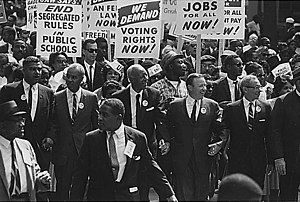 Image via Wikipedia
Image via WikipediaI have been calling people up, I attended one rally, I have been emailing people, I have been building up a mailing list, I have been calling people up. I had a long chat with an Iran democracy activist out there in California last night.
Some of my suspicions have been confirmed. The general hostility to the ideas of raising money and creating an umbrella organization tell me there is much work that remains to be done before the Iranian diaspora organizations can provide concrete help to the next wave of democracy movement work right there in Iran.
The first wave of democracy protests in Iran tried to reform the existing system. Hopefully by now people are convinced that that is not an option. This system can not be reformed, it has to be ditched. A new system has to be built.
Could we build 1,000 Iranian democracy organizations in the diaspora? Could we build a few umbrella organizations? Could we have people meeting in person on a regular basis and using social media as well? Could we raise meaningful sums of money? I am for raising millions of dollars eventually.
I am not a member of the Iranian diaspora. I am a member of the global netroots/grassroots. My interaction with the Iranian diaspora organizations will be as a member of the netroots/grassroots.
I might adopt a few Iranian diaspora organizations to work more closely with. That might also allow me to stay in better tune with the other organizations like them.
Basic organizational work is what is needed.
I am for building "cells" among the Iranian Americans. These would be small groups of perhaps 10 people who have the option to meet each other in person. The leader of each such cell would be networked with one or the other organization all of which would be members of an umbrella organization. All raising and spending money would be transparent within the organization. All members would have a right to know.
Organizations need to prove by raising and spending small sums of money that they can be accountable. The first few rounds of fundraising might have to happen among members before we can approach foundations for big sums of money.
We have to do all necessary homework in the diaspora before we summon people to the streets in Iran again.
New Yorker: Small Change: Why The Revolution Will Not Be Tweeted.: High-risk activism, McAdam concluded, is a “strong-tie” phenomenon...... Even revolutionary actions that look spontaneous, like the demonstrations in East Germany that led to the fall of the Berlin Wall, are, at core, strong-tie phenomena. The opposition movement in East Germany consisted of several hundred groups, each with roughly a dozen members. Each group was in limited contact with the others: at the time, only thirteen per cent of East Germans even had a phone. All they knew was that on Monday nights, outside St. Nicholas Church in downtown Leipzig, people gathered to voice their anger at the state. And the primary determinant of who showed up was “critical friends”—the more friends you had who were critical of the regime the more likely you were to join the protest. ....... There is strength in weak ties ... Our acquaintances—not our friends—are our greatest source of new ideas and information. The Internet lets us exploit the power of these kinds of distant connections with marvellous efficiency........ “The Dragonfly Effect: Quick, Effective, and Powerful Ways to Use Social Media to Drive Social Change” ...... Facebook activism succeeds not by motivating people to make a real sacrifice but by motivating them to do the things that people do when they are not motivated enough to make a real sacrifice. We are a long way from the lunch counters of Greensboro........ the civil-rights movement was more like a military campaign than like a contagion ...... Possible locations for activism were scouted. Plans were drawn up. Movement activists held training sessions and retreats for would-be protesters...... When the sit-in movement spread from Greensboro throughout the South, it did not spread indiscriminately. It spread to those cities which had preëxisting “movement centers”—a core of dedicated and trained activists ready to turn the “fever” into action. ...... a challenge to the establishment mounted with precision and discipline...... a carefully demarcated division of labor, with various standing committees and disciplined groups. ...... Facebook and the like are tools for building networks, which are the opposite, in structure and character, of hierarchies. Unlike hierarchies, with their rules and procedures, networks aren’t controlled by a single central authority. Decisions are made through consensus, and the ties that bind people to the group are loose....... Wikipedia is a perfect example. It doesn’t have an editor, sitting in New York, who directs and corrects each entry. The effort of putting together each entry is self-organized. ...... Car companies sensibly use a network to organize their hundreds of suppliers, but not to design their cars. ...... establish central leadership, trust, and camaraderie through regular, face-to-face meetings....... if you’re taking on a powerful and organized establishment you have to be a hierarchy ....... Even the White Citizens Council, King later said, conceded that the carpool system moved with “military precision.” By the time King came to Birmingham, for the climactic showdown with Police Commissioner Eugene (Bull) Connor, he had a budget of a million dollars, and a hundred full-time staff members on the ground, divided into operational units. The operation itself was divided into steadily escalating phases, mapped out in advance. Support was maintained through consecutive mass meetings rotating from church to church around the city....... The moment even one protester deviates from the script and responds to provocation, the moral legitimacy of the entire protest is compromised....... a town where ninety-eight per cent of the black community could be reached every Sunday morning at church? The things that King needed in Birmingham—discipline and strategy—were things that online social media cannot provide
